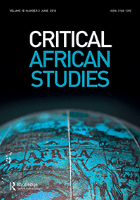
Critical African Studies
Scope & Guideline
Illuminating Africa's Diverse Perspectives
Introduction
Aims and Scopes
- Interdisciplinary Research:
The journal publishes research that spans various disciplines, including sociology, anthropology, political science, and cultural studies, fostering a comprehensive understanding of African issues. - Decolonization and Critical Theory:
A core focus is on decolonizing knowledge and practices, critically analyzing colonial legacies and their ongoing impact on contemporary African societies. - Cultural and Political Critique:
The journal encourages critical examinations of cultural practices, political regimes, and social movements in Africa, often highlighting resistance and subversion. - Gender and Intersectionality Studies:
There is a consistent emphasis on gender issues and intersectionality, exploring how various identities intersect within African contexts, and how this influences power dynamics. - Global and Local Interconnections:
Research often explores the interconnectedness of local African contexts with global phenomena, including migration, trade, and cultural exchanges. - Social Justice and Activism:
The journal promotes scholarship that advocates for social justice, examining the role of activism and grassroots movements in effecting change within African societies.
Trending and Emerging
- Decolonial Health Practices:
Emerging research focuses on indigenous health practices and their relevance in global health discourses, particularly in the context of the COVID-19 pandemic, highlighting alternative approaches to health and healing. - Humor and Satire as Resistance:
There is an increasing exploration of humor and satire as forms of political resistance and social critique within African contexts, reflecting the role of cultural expression in challenging state power and societal norms. - Migration and Mobility Studies:
Recent works emphasize African migration experiences and their implications, exploring issues of identity, agency, and transnational connections, thus addressing the complexities of migration in an increasingly globalized world. - Moral Economies and Social Justice:
A trend towards examining moral economies in various contexts, such as sex work and informal markets, reflects a growing interest in the ethical dimensions of economic practices and their impacts on marginalized communities. - Youth Culture and Activism:
There is a notable increase in research focused on the cultural politics of African youth, particularly how they engage with contemporary issues through popular culture, activism, and social media. - Environmental and Land Rights:
Emerging themes include the intersection of environmental issues and land rights, particularly in relation to indigenous knowledge and practices, reflecting a broader discourse on sustainability and justice in Africa.
Declining or Waning
- Traditional Economic Development Models:
There has been a noticeable decline in papers focusing on conventional economic development models, as the journal increasingly prioritizes critical and alternative economic frameworks, such as moral economies and grassroots development. - Colonial History Narratives:
Research specifically centered on historical colonial narratives has waned, suggesting a shift towards contemporary issues and the implications of colonial legacies rather than a focus solely on historical accounts. - Static Cultural Representations:
Themes that portray static or monolithic representations of African cultures are less prevalent, indicating a move towards more dynamic and fluid understandings of culture that account for change and agency. - Solely Western Theoretical Frameworks:
There is a diminishing trend in the application of exclusively Western theoretical frameworks without consideration of indigenous perspectives, as the journal increasingly values local epistemologies. - Overly Generalized African Studies:
The journal appears to be moving away from broad, generalized studies of Africa, favoring more specific, context-driven research that addresses particular issues within individual countries or communities.
Similar Journals
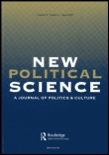
New Political Science
Exploring contemporary political landscapes.New Political Science is a premier academic journal published by Routledge Journals, Taylor & Francis Ltd, dedicated to the exploration of contemporary issues in political science and sociology. With its ISSN 0739-3148 and E-ISSN 1469-9931, this journal has been a significant voice in the field since its inception in 1979, providing a platform for rigorous scholarly discussion and innovative research. Its scope encompasses critical analyses of political phenomena, offering insights that are particularly relevant in today's socio-political climate. As part of the Q3 category in Sociology and Political Science, its impact is underscored by a Scopus rank of #837 out of 1466, placing it within the 42nd percentile among peer journals. Though not open access, the journal remains committed to disseminating high-quality research to its audience, thereby enhancing understanding and fostering dialogue on key political issues globally. With a convergence of years extending from 1979 to 1986 and from 1989 to 2024, New Political Science continues to serve as an essential resource for researchers, professionals, and students alike, ensuring that critical political discourse thrives.

Journal of African American Studies
Connecting Scholars Through the Lens of African American StudiesThe Journal of African American Studies, published by SPRINGER, is a prestigious academic platform dedicated to the exploration and dissemination of research related to African American culture, history, and social issues. With an ISSN of 1559-1646 and an E-ISSN of 1936-4741, this journal has established itself as a key resource within its field, evidenced by its categorization in the Q1 tier for Cultural Studies and notable rankings in Gender and Sociology disciplines. As of 2023, it occupies competitive positions on Scopus, highlighting its valuable contributions to social sciences. The journal aims to foster scholarly dialogue and offer insights into the complexities of African American experiences, making it essential reading for researchers, professionals, and students alike. For those interested in contributing to the ongoing discourse, access options are available through institutional subscriptions, ensuring a broad reach for groundbreaking articles aimed at enriching the academic landscape.

Altre Modernita-Rivista di Studi Letterari e Culturali
Innovating Research in Literature and CultureAltre Modernita-Rivista di Studi Letterari e Culturali, published by Milano University Press, serves as a significant platform in the fields of Cultural Studies, Linguistics, and Literature. Since its transition to Open Access in 2009, this journal has made strides in democratizing knowledge, ensuring that resources and research are accessible to a broader audience. With an ISSN of 2035-7680, it publishes innovative research and critical discourse aimed at fostering interdisciplinary dialogue within the humanities. Although currently positioned in Q4 and Q3 quartiles, Altre Modernita is steadily contributing to academic conversation, promoting literary analysis, cultural critique, and linguistic exploration. Located in Italy, it invites contributions from scholars worldwide, encouraging a diverse range of perspectives. Altre Modernita remains a valuable resource for researchers, professionals, and students dedicated to understanding the complexities of modern literature and cultural narratives.
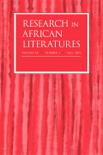
RESEARCH IN AFRICAN LITERATURES
Unveiling the Rich Tapestry of African TextsRESEARCH IN AFRICAN LITERATURES is a prestigious peer-reviewed journal published by Indiana University Press, dedicated to the critical exploration of African literary traditions, cultures, and texts. With an ISSN of 0034-5210 and an E-ISSN of 1527-2044, this journal stands out in the field of literature and literary theory, currently ranking in the 80th percentile of its category according to Scopus, making it a significant platform for scholars and researchers alike. Since its establishment, the journal has evolved through converged volumes from 2002 to 2024, consistently fostering innovative discourse and interdisciplinary approaches that illuminate the complexities of African narratives. Although it does not offer open access, the journal is integral for anyone engaged in African studies, providing critical insights that are essential for understanding the broader implications of literature within diverse cultural contexts. The journal's commitment to high standards of scholarship is reflected in its Q3 quartile ranking and its influential contribution to contemporary literary dialogue.
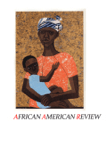
AFRICAN AMERICAN REVIEW
Advancing Conversations on African American Cultural NarrativesAFRICAN AMERICAN REVIEW, published by the Johns Hopkins University Press, stands as a pivotal journal since its inception, dedicated to exploring the multifaceted aspects of African American literature, culture, and artistic expression. With an ISSN of 1062-4783 and an E-ISSN of 1945-6182, this journal provides a critical platform that delves into the rich tapestry of African American experiences, bridging gaps across literary, cultural, and visual arts disciplines. Its latest impact metrics position it in esteemed quartiles, achieving Q2 rank in both Literature and Literary Theory and Visual Arts and Performing Arts, alongside a strong presence in Cultural Studies with a Q3 classification. The journal’s commitment to high-quality scholarship is reflected in its Scopus rankings, drawing attention from researchers and scholars invested in cultural narratives and historical contexts. Although not currently open access, the journal's comprehensive analyses contribute significantly to discussions in academia and beyond, making it an essential resource for researchers, educators, and students alike looking to deepen their understanding of African American contributions to the arts and humanities.
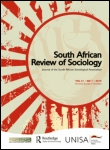
South African Review of Sociology
Connecting Research and Realities in South AfricaSouth African Review of Sociology is a pivotal academic journal in the field of sociology, published by Routledge Journals, Taylor & Francis Ltd. With its ISSN 2152-8586 and E-ISSN 2072-1978, this journal offers a platform for critical discourse on contemporary social issues relevant to South Africa and beyond. Since its inception in 2006, it has steadily contributed to the advancement of sociological scholarship, achieving a commendable Q3 ranking in the social sciences and currently positioned within the 39th percentile of general social sciences as per Scopus metrics. Although it operates without an open-access model, it remains an essential resource for researchers, professionals, and students looking to engage with cutting-edge research and thoughtful analyses that reflect the complexities of social dynamics. As the journal continues to evolve through 2024, it invites contributions that probe deeper into the sociocultural fabric of society, making it a significant asset for anyone interested in the sociological dimensions of contemporary life.

Annee du Maghreb
Bridging Cultures: A Platform for Maghreb StudiesAnnée du Maghreb, published by CNRS Éditions, is an esteemed open-access journal dedicated to advancing the study of Mediterranean and North African cultures, history, and societies. Since its inception in 2004, the journal has aimed to foster a deeper understanding of the complex socio-political dynamics, artistic expressions, and historical contexts of the Maghreb region. By providing a platform for rigorous research and interdisciplinary dialogue, Année du Maghreb plays a pivotal role in enriching academic discourse and enhancing knowledge within the fields of anthropology, history, and cultural studies. Accessible to a global audience, this journal invites researchers, professionals, and students to contribute to its growing repository of scholarly work, ensuring the continuation of high-quality discussions pertinent to this vibrant area of study.
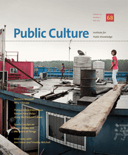
PUBLIC CULTURE
Challenging Conventions, Inspiring Dialogue.PUBLIC CULTURE is a distinguished journal published by DUKE UNIVERSITY PRESS, known for its critical engagement with contemporary cultural studies and interdisciplinary scholarship. As a leading platform since its inception in 1996, PUBLIC CULTURE examines the intersections of culture, politics, and various social paradigms, fostering dialogue that challenges conventional wisdom and encourages innovative perspectives. With an impact factor that reflects its robust academic contribution, the journal is indexed in Scopus and spans multiple disciplines, ranking within the top quartiles in Arts and Humanities as well as Communication. Although it operates under a traditional subscription model, its scholarly output significantly influences fields within social psychology and related areas, making it an essential resource for researchers, professionals, and students seeking to engage with the dynamic landscape of public culture. With its commitment to publishing high-quality articles that explore the complexities of cultural phenomena, PUBLIC CULTURE remains a vital conduit for scholarly exchange and discovery.
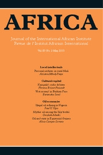
AFRICA
Advancing Knowledge, Shaping PerspectivesAFRICA is a premier journal published by Cambridge University Press, dedicated to advancing scholarly research and discourse within the realms of Anthropology, Arts and Humanities, and Geography. Established in 1928, this journal has demonstrated an unwavering commitment to excellence, consistently achieving Q1 status in its respective fields as of 2023, demonstrating its impact and prestige in the academic community. With Scopus rankings highlighting it among the top 80th percentile in Social Sciences and 72nd percentile in Arts and Humanities, AFRICA serves as a vital resource for researchers, professionals, and students seeking to explore the complexities of African societies and cultures. The journal promotes a multidisciplinary approach, encouraging contributions that address contemporary challenges and opportunities within Africa. Although access is not open, AFRICA remains an essential asset for anyone aiming to deepen their understanding of the continent's diverse narratives and dynamics, publishing high-quality, peer-reviewed articles that shape the future of African studies.
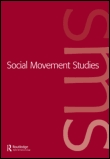
Social Movement Studies
Advancing Understanding of Social MovementsSocial Movement Studies, published by ROUTLEDGE JOURNALS, TAYLOR & FRANCIS LTD, is a premier academic journal dedicated to the interdisciplinary exploration of social movements, their dynamics, impacts, and the sociopolitical contexts in which they arise. With an ISSN of 1474-2837 and an E-ISSN of 1474-2829, this journal plays a pivotal role in the fields of Cultural Studies, Sociology, and Political Science, as evidenced by its impressive Q1 ranking in these categories for 2023. The journal's significant position is further underscored by its Scopus rankings, placing it in the 99th percentile for Cultural Studies and the 95th for Sociology and Political Science, indicating its substantial contribution to scholarly discourse. Although not open access, the journal fosters a rich publication environment from 2010 to 2024, encouraging rigorous empirical research and theoretical innovation that enriches our understanding of grassroots mobilization and collective action. Scholars, professionals, and students alike will find a wealth of insights and critical analyses that empower them to engage effectively with contemporary social issues.